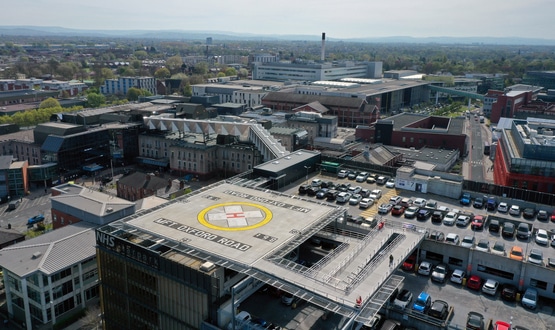NHSE awards £1m boost for wireless innovations to improve patient care
- 13 February 2024

NHS England has awarded around £1 million to seven trusts as part of its Wireless Trials programme.
The project seeks to make the most of cutting-edge wireless technologies to provide the best care and experiences for patients, while freeing up more time for staff to spend with them. The trials will also aim to strengthen connectivity in A&Es and ambulance bays.
Manchester University NHS Foundation Trust will pilot an innovative approach of combining satellite and cloud-based wireless solutions to enhance connectivity across their 10 hospital sites and wider community services.
Mid Cheshire and Princess Alexandra Hospital NHS trusts will use the funding to install wireless trackers on medical equipment and hospital beds, which allow real-time monitoring and location tracking so that staff can easily find what they need, when they need it.
The North West and East of England ambulance services trusts will also roll out improved wireless connections in A&E and ambulance areas, speeding up the transfer of essential patient care data from ambulances to hospitals.
Another project, run by Sussex Community NHS Foundation Trust, will introduce a new app that allows staff to take observations on tablets and smartphones by a patient’s bedside, reducing the time spent typing up patient notes and providing more time to spend with patients.
In addition, a trial at the Countess of Chester NHS Foundation Trust will wirelessly link modern diagnostic devices with the trust’s electronic patient records system, speeding up assessment time for patients.
Stephen Koch, executive director of platforms at NHS England, said: “I have been impressed with the innovative ideas coming from the system and we are delighted to be able to award this funding to the successful trialists to develop new or improved wireless solutions for the NHS.
“We’ll be monitoring the outcomes of the trials and are very hopeful that a number of these will be able to be scaled more broadly across the health and social care system saving clinical time, improving patient care and saving money for the system.”
Dan Prescott, group chief information officer at Manchester University NHS Foundation Trust, said: “As one of the country’s largest NHS trusts, it’s essential that we can provide continuous patient care with minimum disruptions.
“With the Wireless Trial we’re aiming to create a reliable, fast and secure network access solution to address unexpected connectivity issues, even in areas of poor-connectivity. This is vital in supporting key initiatives for our staff and giving our patients the best possible care.”
Previous wireless trials included the development of University College London Hospitals’ Find and Treat service, which uses high-tech tools and software to provide real-time remote diagnosis and referrals on board a mobile health unit.
Another trial led to South London and Maudsley NHS Foundation Trust becoming the first 5G-connected hospital in the UK. This new round of the programme aims to provide NHS organisations with the capability they need to deliver the challenging digital ambitions set out in the NHS Long Term Plan.
Participants will benefit from funding for their project, advice and guidance from NHS England, and the opportunity to collaborate with like-minded organisations. NHS England will also capture best practice from successful trials and share this across the wider NHS. Applications for the next series of wireless trials will open later this year. More details are available on NHSE’s Connectivity Hub.




